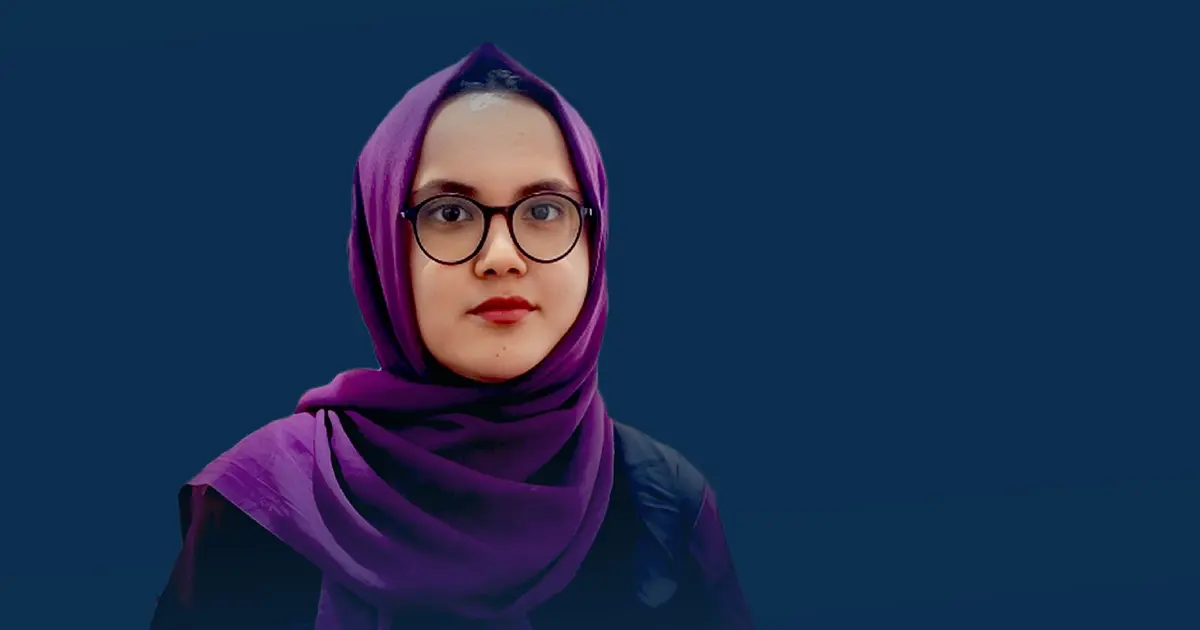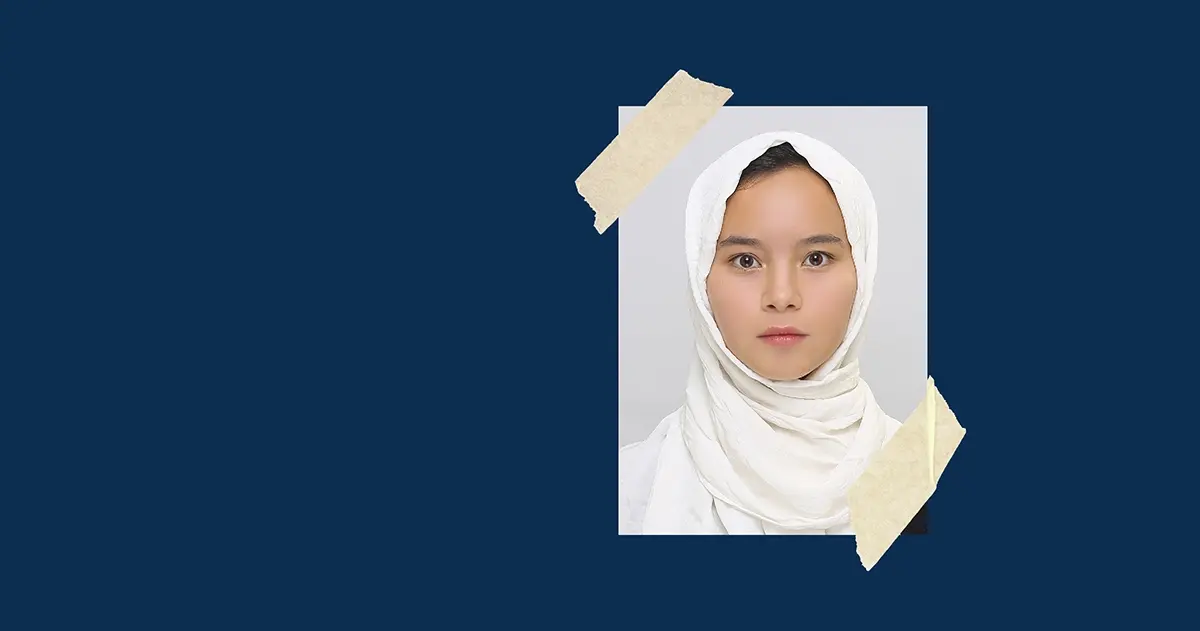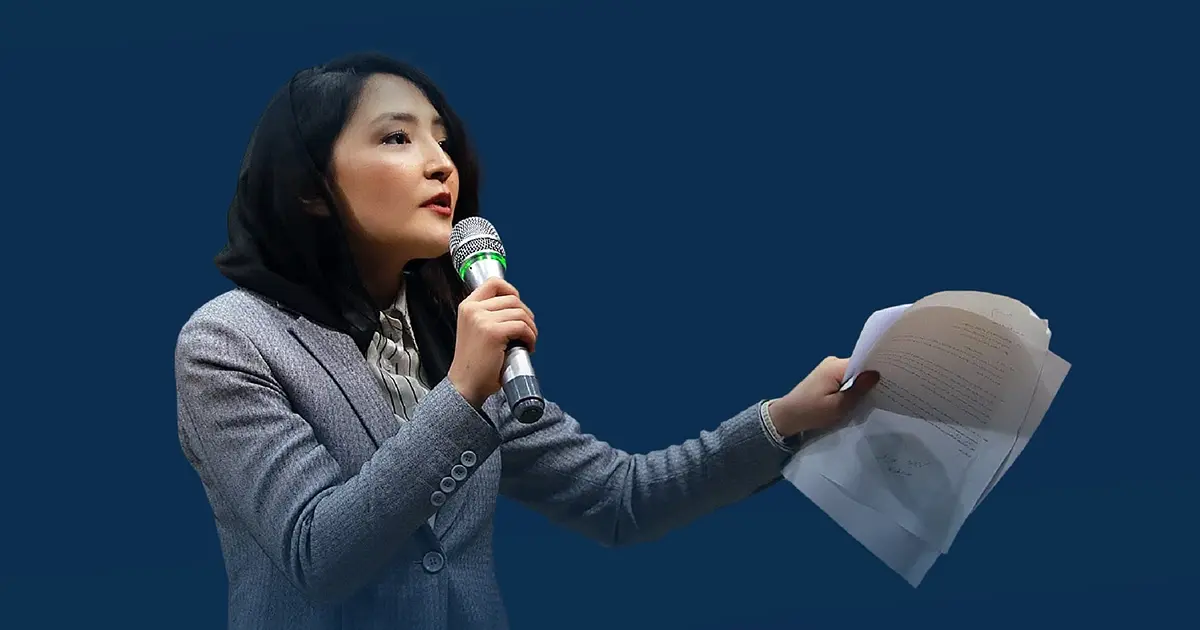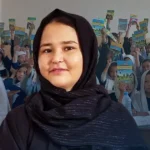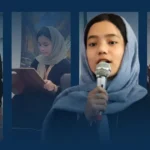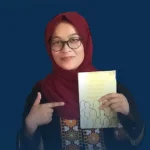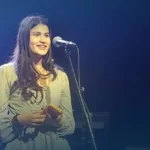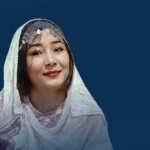FutureSheLeaders (8)
Zahra Ahmadi, a sixteen-year-old girl from Mazar-e-Sharif;
a narrator of pain and light in a land where being a girl is a daily test of resilience.
Born in Daikundi and brought to Mazar before her first birthday,
She lost her father, a police officer, at a young age—but his strength and kindness live on in her spirit.
With eyes full of dreams and a heart full of questions, Zahra learned to write—to give voice to herself and to silenced girls across her homeland.
In a letter to her martyred father, she wrote: “You are alive in every word I write.”
From the Empowerment sessions and her leadership of the “Light Keepers” group, to earning the international Forward Academy scholarship, she has lit her path with words, wisdom, and unwavering hope.
For her, being a girl is not a weakness—but a chance to lead, to transform, and to build a more just world.
She seeks to redefine leadership—not through power, but through empathy, understanding, and humility.
She believes: “Dreams do not die—so long as we do not forget who we are.”
Royesh: Zahra jan, hello! Welcome to this episode of FutureSheLeaders.
Zahra: Hello, dear teacher. I hope you’re well and happy!
Royesh: Zahra jan, tell us a bit about yourself, your family, and your parents. How old are you? Where were you born?
Zahra: I’m Zahra, born in 2009 in Daikundi. I think I was under a year old when we moved to Mazar. We’re a family of five. Both my parents grew up in Iran before coming to Mazar.
Royesh: Did they marry in Iran, then move to Daikundi and later to Mazar?
Zahra: I think my father came to Afghanistan at 12. He married at 16 in Daikundi. I was born there, and we moved to Mazar when I was about ten months old.
Royesh: Were your parents educated?
Zahra: Both my parents were educated. My father was a military officer—he studied up to grade 6 in Iran, then joined the army. My mother studied up to grade 4 in Daikundi, then continued to grade 12 after moving to Mazar.
Royesh: A few months ago, you wrote a letter to your father—it was published on Sheesha Media as “To My Father.” Do you remember the feeling behind it? Could you share that with us?
Zahra: It was on a Friday—we had a monthly test. A girl stepped on stage and passionately spoke about heroes. She said we are the heroes of history, and thanked her parents and teachers. The hall was so quiet, it felt like even the walls were listening. I listened deeply. When she said “hero,” I thought of my father. I came home. Whenever I get emotional, I feel energized. I believe emotions are one of the strongest forms of energy. I just had to write. I wrote a letter. Or maybe it was a story. Or lessons I learned from my father. I titled it: “My Father Is Always Here; He Never Dies.” In that letter, I shared my feelings—how much I tried afterward, how deeply he inspires me. I wrote: “Father, you are always with me. In every step I take, every word I write, every lesson I learn, and every word I teach—you live on.
Royesh: If your father were here today, seeing you speak so confidently as a FutureSheLeader, what do you think he’d feel?
Zahra: He didn’t speak much, but when he did, it was deep and beautiful. Maybe he’d first stay silent… then smile and say, “Well done, my daughter. You make me proud.” The word proud means a lot to me. When my mom or grandmother says, “Zahra, I’m proud of you,” it gives me so much energy. I think he would’ve smiled… feeling proud and full of joy.
Royesh: You’ve shared parts of your father’s lessons. What’s the most important one he taught you?
Zahra: The lesson of patience and endurance. There’s a verse in the Qur’an that says: “Indeed, with hardship comes ease.” Maybe that’s the lesson I learned from my father. He was deeply responsible—I learned responsibility from him. I learned kindness. I learned that even in the hardest times, you can be strong… you can grow again.
Royesh: The absence of a father—or growing up without him—can feel incredibly heavy. How did you and your mother cope with that void? Who supported you the most through it?
Zahra: My mother, my grandmother, and I—we were deeply connected to my father. His absence left a heavy emptiness. Maybe we never really overcame it—we just learned how to live with the pain. I have a little brother named Abolfazl. He’s seven and a half now. He looks a lot like my father. Sometimes I think he might even grow up to be like him. My grandmother always says, “Abolfazl is just like your father. I want to raise him to be our Alireza.” Maybe, in some way, Abolfazl filled a small part of that emptiness. Maybe… I even saw him as my hero.
Royesh: It’s been over three and a half years since I first met you in the Empowerment Sessions at Cluster Education. For a long time, I didn’t know your father had passed. You always seemed joyful, calm, and strong. After that deep shock, what truly helped you stand—like leaning on a cane—find your strength again, and continue walking forward with steady steps?
Zahra: There are many reasons—many things that stop a person from giving up. I think my family was a big reason I kept going. Even though my father is gone, his presence lives in me. He was martyred so I could live freely, study, and breathe without fear. To give up would feel like a betrayal—to my mother, my grandmother, and to him. Every time I study, I see joy in their eyes. And I feel like giving up would betray that joy… a betrayal of my mother’s hope, my grandmother’s love, and my father’s sacrifice.
Royesh: Right now, this very year—how old are you?
Zahra: This year, on the 6th of September, I’ll turn 16. So there’s about two months left.
Royesh: Turning 16—especially for a girl in Afghanistan—is not a small milestone. We know that being a girl in Afghanistan isn’t easy. But you’ve experienced not only being a girl—but being a girl without a father. Tell us—what does girlhood mean to you?
Zahra: For me, being a girl in Afghanistan carries the message of courage. We Afghan girls really have to try hard. It puts us on a path—because if we don’t try, we’re left behind. So instead of seeing it as a limitation, I see it as strength.To me, it’s a message of courage—not a limitation. It tells me: Zahra, you can change the world. You can shift the mindset of thousands. So why stay silent? Why sit still when you have the power to create change?
Royesh: In the society you live in, girls are largely ignored. Religious beliefs, cultural norms, traditions, the economy, and politics—all seem to conspire in an unspoken agreement to erase girls. How did you raise your voice in the middle of all this?
Zahra: I believe raising your voice isn’t always about shouting. Sometimes, silence speaks louder than words. Through writing, reading, and teaching—I found my voice. And I think that voice is louder than any scream. It’s one of the most beautiful, and one of the strongest voices: To teach, to learn, to write, to read, to experience—That, to me, is the loudest voice of all.
Royesh: Has anyone ever told you, “Zahra, you can’t”? If yes, how did you respond? Did it hurt your spirit?
Zahra: Of course. It hurts anyone—especially when you’re deeply invested in your efforts and someone says, “Zahra, you can’t.” And it’s not just words. It can be said through a glance, a smirk, a sarcastic comment. Early on, I heard it a lot. I was a sensitive girl. Someone once said, “Why study? What will it lead to?” Another said, “Women are made to stay at home—this isn’t for them.”
Those words shook me. But they also fueled me. I wanted to prove them wrong—to show what a girl can do. To make them stop saying, “You can’t,” and start asking, “How did you do it?” Now I’ve learned that knowledge is power—regardless of gender. And power is essential to survive in this world. As Viktor Frankl said: “Those who have a why to live can bear almost any how.”
Royesh: Was there a turning point in your life when you clearly felt—this is the moment I have to start fighting for my future?
Zahra: When did I take the fight seriously? I think it was the moment I realized—no one else would fight for me. They might cry for me, feel sorry for me, be sad for me… But not fight. Only I can do that. If we don’t fight, if we don’t try—we’ll be forgotten. To survive, we must read, write, and teach.
Royesh: Studying isn’t easy. It needs a special drive, a kind of love. What truly motivates you to keep learning? And what does education mean to you—as a girl? Do you think it’s different from what it means for boys?
Zahra: Studying is a beautiful word. What motivates me most is the world around me—the lack of knowledge I see, the emptiness. There aren’t many educated people around us. The difference is: when a boy walks into a room, he carries confidence—because society tells him he’s capable, that he belongs.
But when girls walk in, they carry less confidence… they carry wounds and pain. And I believe— these wounds… this pain… are what push us to try harder.
Royesh: What was your experience like entering the Cluster Education program? How did you hear about it, and what did you feel on your first days—fear, excitement, confusion?
Zahra: I’d like to start a bit earlier. When the Taliban came to Mazar, I was in 7th grade. For a few days, schools stayed open—we kept going. Girls in Mazar studied about a year and a half longer than elsewhere. Some of my classmates were attending Najee Academy. They told me about a new program called Cluster Education—where girls could study science, along with Dari and English. I’ve always been an energetic and curious girl.
The same day, I told my mom: “There’s a program starting—I want to join.”
She said, “Go.” I attended Cluster Education in the afternoon. There were many classes, split between two shifts. Since I went to a private school in the morning, I joined Cluster later in the day. Girls from public schools came to Cluster in the morning and attended school in the afternoon.
When I first entered Cluster, it felt like a whole new world—so beautiful and different. I’m naturally curious, cheerful, and full of questions. In those early days, our teachers were amazing. I asked lots of questions—I was excited to solve equations, to learn chemistry and physics. Then the program paused for a while.
But in 1402, it started again—and I returned, full of excitement. This time, I joined the morning session, since school was no longer an option. I met new girls, and the environment felt fresh again. Soon after, the Empowerment Sessions began.
At first, I was simply excited. But over time, they gave me something deeper: They revived my ability to say “I am here.” “I can create change. And change begins with me.”
Royesh: Zahra jan, Najee Cluster was one of the first where Empowerment sessions began—and you were among the first students to join. Besides what you said about discovering your voice, what else did Empowerment open up for you? What felt truly new—like entering a different world?
Zahra: One beautiful word comes to mind: “Vision.” Sohrab Sepehri says, “We are nothing—but a vision – a way of seeing.” And, “You must wash your eyes and see differently.”
Empowerment was a beautiful experience. At Najee Cluster, we had so much to say—and we understood each other deeply. Empowerment changed how I saw things. It helped me stop seeing girlhood in Afghanistan as a limitation—and start seeing it as a chance, even a kind of strength.
One way of looking is a limiting belief which says: “I’m an Afghan girl—I can’t connect with the world; I can’t speak loudly.” But another way says: “Because I’m an Afghan girl—I can do exactly that.”
One of the most beautiful lessons I learned from you in Empowerment was how to play with words. That made me curious about the meanings. I started looking up words like “self,” “power,” “family,” and “perspective” in dictionaries—trying to go deeper into their meaning. Empowerment truly changed my life.
Royesh: In Empowerment, you practiced some deeply personal exercises—like looking into a mirror, speaking to yourself, or talking to your hands. Which one did you try yourself? Do you have a special memory from any of them?
Zahra: I did every exercise the teacher suggested. Looking in the mirror—I do that often. Talking to myself—I do that a lot, too. But one of the most beautiful exercises was speaking to my body—especially to my hands. Because I’ve written so much, one of my fingers is slightly bent now.
When I look at my hands, I see a strange kind of depth. Hands that work hard, hands full of curiosity and drive. They belong to someone who keeps trying, keeps asking. That, I think, was one of the most beautiful Empowerment exercises for me.
Royesh: One lesson in Empowerment that always made you excited was when we said: “A donkey isn’t a donkey because it’s a donkey.
It’s a donkey because it doesn’t know it’s a donkey.” What did that sentence mean to you? What understanding did it awaken in you?
Zahra: “A donkey isn’t a donkey because it is a donkey—it’s a donkey because it doesn’t know it is a donkey.” That was such a beautiful phrase—a clever play on words. It helped me understand the difference between a name and a quality.
Since then, I’ve paid more attention to my name, Zahra—instead of focusing on the labels others give me, like “Zahra, you’re talented” or “Zahra, you’re beautiful.” I started paying more attention to my name—Zahra. Because a name reflects who you are. Zahra means radiant face. And even in its sound, there’s meaning: It starts soft—/zah/—then grows stronger—/ra/. That felt so beautiful and full of reflection.
Maybe I’m still small now, maybe I haven’t fully grown yet— but one day, I will bring a big change.
Royesh: One of the key lessons in Empowerment was building connection—understanding power through relationships, finding strength in each other. What was that like for you? Who was the first friend you connected with through the lens of Empowerment?
Zahra: Friends are deeply valuable in life. Every person who enters our lives leaves a mark—through their goodness or their flaws.
One of the most beautiful parts of Empowerment was forming groups.
Working alone is one thing—but in a group of five, you bring together five strengths to focus on one idea. That’s a powerful force. And that power comes from how we connect with others. Not just with friends—each of us here represents a family. So when we connect, it’s not just person to person—it’s family to family.
And together, we form a much larger chain.
Royesh: Now that you’ve completed an Empowerment course, and you observe other girls your age in Najee Cluster—what differences do you feel between you and them? And between girls and boys in general—what qualities do you think you girls have that boys around you often lack or don’t notice?
Zahra: When I joined Najee Cluster, I felt a deep sense of connection. We were all girls, all Afghan, all living in Mazar, all part of the same learning space. I think my sisters—because of the limiting beliefs imposed by society—began turning inward during Empowerment. They discovered their inner strength… and also each other’s strength.
One of the key lessons I took from Empowerment is this: Gender is a lens to recognize individual differences—not a reason for discrimination. At the same time, I see boys in our society constantly struggling—trying to stay human in a world that expects them to show only force, only toughness.
I believe when the inner strength of girls meets the human struggle of boys to remain kind and whole—together, they create a truly powerful force.
Royesh: No one is completely unaffected by society’s judgment. Your environment says many belittling and disempowering things about girls. Have you ever felt weak—or ashamed—just for being a girl?
Zahra: I may have felt weak at times just because I’m a girl—but I’ve never felt ashamed of it. What hurts more is how society looks at women—as if they can’t do anything, as if they should stay at home. But the turning point for me—what Empowerment taught me—was to turn inward, to find strength within, and to see girlhood not as a limitation, but as a path for growth.
When girls come together with awareness—girlhood plus knowledge, I believe that creates a truly powerful force.
Royesh: From where you stand now—Zahra, 16 years old, living in Mazar, in today’s Afghanistan—if you could say one sentence to represent yourself to the girls of Afghanistan, what would it be?
Zahra: I would say: I am Zahra, a 15-year-old girl speaking not just for myself—but for a society where being a girl is seen as a limitation. We Afghan girls have dreams. We know what love means. And we ask you—let’s build a world together where being a girl is not a crime, not a burden, but a source of pride. Let us no longer see girls who feel pain or shame—just for being who they are.
Royesh: And if, from this same place—as a 16-year-old Afghan girl—you had one sentence to say to other girls your age around the world, what would it be?
Zahra: From where I stand, I would say: I am an Afghan girl—and I’ve come to understand how beautiful girlhood truly is. To the girls around the world: Don’t see us only as statistics—as those who suffer, are silenced, or killed. See us as people who turn restrictions into opportunity, who use limitations as tools for change.
Royesh: In Empowerment, change is the core of your practice. You move from where you are toward your ideal self. What’s the most important change you’ve seen in yourself after participating in the sessions?
Zahra: Maybe it shows in the way I speak now, or how I act—but more than anything, I think the change is in my vision and perspective. The way I see the world… that has truly changed. I never imagined reaching a place where I could speak like this—where Zahra, a 15-year-old girl who has suffered so much, still keeps going, still keeps trying. Empowerment helped me look inward, see myself, and practice the art of saying “I am.” And I think… one of the most beautiful changes in me was the way I now see.
Royesh: One of the meaningful exercises in Empowerment is group-building. You learn how to live and grow in a group—five-person teams where girls form close, supportive circles. Have you worked in a group like this? Are you part of any specific one?
Zahra: Yes, we are a group of five called the Light Keepers. I’m the group leader. One of our most beautiful activities is teaching girls, boys, and anyone who truly needs education. I believe learning is one of the greatest forms of change. The first time I taught someone, I felt—their success is also mine. When someone learns something… something grows in me too. Another beautiful thing we did was group writing. We wrote a lot together—especially for the Peace on Earth Game by 2030. We each wrote letters from where we are now to where we imagine ourselves in 2030. I wrote to the future Zahra of 2030, to Sediqa of 2030, to Roqia of 2030. I wrote from today’s Zahra, imagining her future… and also from the Zahra of 2030, looking back at her 15-year-old self.
Royesh: What’s one memorable and meaningful story from your group work or Empowerment sessions that others could learn from—and be inspired to join group activities? One of the most beautiful memories we had was during our group teaching sessions. At Najee Cluster, each class has 20 to 30 students. We taught in separate classrooms. One memory I’ll never forget was when the mother of one of my students told me: “Teacher, thank you so much. For the first time in a long time, I see my child picking up a pen with excitement, reading with passion.” Her son hadn’t been very interested in studying. He rarely did his homework. But I always encourage my students—I try to be a source of inspiration. After a few days of doing his homework and reading more, I gave him a small prize. I had always explained the value of learning to him. His mother said:“This is the first time my son has ever won a prize in class. It’s the first time in a long while that I see him studying, trying… and staying away from unproductive things.”
Royesh: You were one of the selected students for the Forward Academy scholarship through a competitive process. What exactly was this scholarship—and how did you get it?
Zahra: Forward International Academy has been such a special experience for me. When I first heard about it, you told us about the opportunity—one of our friends from the 30 Birds Foundation, Amy Madsen, had found the opportunity. That day, I was so excited and full of joy. I applied… but a few days later, I got a message saying, “Sorry, our scholarships are full. We hope to have you in future rounds.” I was heartbroken. I cried a lot that day. But less than a month later—I got an email that said: “Zahra jan, we’d be thrilled to have you join the FIA journey. We’ve worked with Afghan students before, and we’d be honored to have you.” They sent me a calendar link to book my interview. I was nervous.
My interview was scheduled at 1:45 AM—but by 1:30, I still hadn’t received the Zoom link. I panicked. I emailed them—and then got the link just in time. When I joined, I saw that my interviewer was Ms. Lou Tinambacan— who is now our history teacher and one of FIA’s directors.
At the end of the interview, she told me: “Zahra, you are truly amazing.” It was one of the most beautiful things I’ve ever heard. She said: “For a 15-year-old girl, you shine so brightly—your English, your journey, your energy.” FIA became a beautiful space for me. We study six subjects—but more than academics, it’s about connection. It’s a place where I can share my story… and where I can inspire others.
Royesh: So what exactly is this scholarship? What are its benefits, and what do you study—over what period?
Zahra: I think this scholarship is a kind of personalized learning platform. Each semester lasts between three to six months before moving to the next term. Right now, I’m in my first term— and I have my midterm exam on August 12. It’s a very beautiful learning environment. Even though it’s a self-paced platform, we have regular meetings—weekly or monthly—with our instructors. That’s where we meet our classmates too. We share our experiences at Forward Academy, work on group projects, and learn from each other’s stories— stories from girls in Pakistan, the U.S., Portugal, and even from inside Afghanistan. It’s really inspiring.
Royesh: How did you feel when you found out that the Forward Academy scholarship was officially yours? How did you share the news with your mother and family? What was their reaction? Two days after my interview, I got the email— they said I could begin my official courses on March 17. I was at home with my little brother and my grandmother. My mother was away in Herat. I ran to my grandmother—I was outside, she was inside. I said, “Grandma, I got the scholarship!” I had already told her about FIA. My mom’s phone was off that day. I called her over 32 times trying to share the news. More than my own excitement, it was their joy that meant everything— the sparkle in my grandma’s eyes, the joy in my mom’s voice. It was one of the most beautiful experiences I’ve had. At first, my grandma didn’t seem that surprised. I asked her why she wasn’t as excited as I was. She said, “When I see how hard you work, Zahra, this doesn’t surprise me.
I always believed you would get somewhere.”
Royesh: Since starting your courses at Forward Academy, how have you experienced the differences between education in Afghanistan and in the U.S.?
Zahra: I think there are many differences—and these differences are what make the two systems so distinct. The biggest one, I feel, is belief in the student. At Forward Academy, the environment is beautiful. It truly believes in the learner. There, we study not just to pass exams— but to understand, to think, to ask questions. In Afghanistan, most students study just for exams. By grades 10 to 12, the entire focus becomes preparing for the Kankor (university entrance exam). It’s more like a transactional system— if you study, you get good grades. If you don’t, you fail.
But at Forward Academy, we work on projects, we speak, we create videos, and most importantly—we’re encouraged to think. We bring the lesson into our real lives. And that’s what makes learning truly meaningful.
Royesh: Which lesson or project at Forward Academy meant the most to you—and why?
Zahra: In each subject, we have two parts: a project or homework,
and then a reflection— a personal response to what the lesson meant to me. What I felt, what it reminded me of, how it changed me.
One of the most meaningful lessons was about the three paths to wisdom: Confucianism, Buddhism, and Stoicism.
Confucianism said if our morals are good, society becomes good— it focused on our relationships: with friends, family, and even rulers.
Buddhism taught that suffering is part of life— but we can find a way to free ourselves from it.
Stoicism said we should accept fate— and that peace comes from accepting what we cannot control.
Our project was to reflect on how we see these three philosophies in our own lives. That was one of the most beautiful projects I’ve done. I got a perfect score—100 out of 100. My history teacher wrote to me: “Zahra, you are truly inspiring in all your work.” She even wrote: “That really moved me.”
Royesh: Is there a teacher or friend at Forward Academy who’s had a special impact on you?
Zahra: Yes, definitely—two people: My history teacher, Ms. Lou Tinambacan, and our student success manager, Ms. Ellie Sprinkmann. They’re both incredible. They truly understand. I told them I’m a student, a writer, and a teacher— and they really encouraged me. They even asked me to send them my writing.
In our English Literature class, we analyze literary texts in every lesson. The texts are so powerful. Awakening. One of my favorites was by Kate Chopin, a 19th-century author. It was from The Awakening—about a woman named Louise Mallard who tastes the meaning of freedom
after losing her husband. I wrote a reflection on that story—both as a homework assignment and as a personal connection to my own life. I found parts of myself in Louise. I wrote that in my reflection, and my literature teacher asked me to send it to her. When she read it, she praised me deeply. Later, in one of our class sessions with other students, she even mentioned my writing and said: “Zahra, for a 15-year-old girl—you are truly remarkable.”
Royesh: Among all your activities at Forward Academy, is there a friend—someone your age or classmate—who’s had a meaningful impact on you?
Zahra: Yes, I have many friends— but one stands out: Mahboba Mobarez. She’s also Afghan and one term ahead of me. She’s my teammate on some projects. She’s such an inspiring girl— full of energy, cheerful, and bright—just like me.
I think what connects us is our similarity: We both live in Afghanistan, we’re both girls, we both study at FIA, and—we both work hard. How have the group sessions in Empowerment and the teamwork you do in Forward Academy changed your daily life? What impact have they had? The group sessions we have in Empowerment and at Forward Academy really shape us— they have a big impact on our personalities. The Empowerment sessions might be even more influential for me— because I spend more time with my group members there. We’ve become like sisters. We work together, study together, and share our experiences. We find similarities in each other’s lives— and I think we truly become a source of inspiration for one another.
Royesh: What field would you like to pursue in the future?
Zahra: My dreams have changed a lot since I was a child. When I was little, I wanted to be a teacher— and now, I am a teacher. In grade 8, I dreamed of becoming a doctor. But now, I want to work in technology— to study computer science and focus on artificial intelligence. Because I believe— if we want to survive in this world, we must adapt to change.
Royesh: Have you ever imagined yourself—one day—as a teacher, a leader, someone who shapes the mindset of the world?
Zahra: Yes—this is one of the images I carry often. At night when I can’t sleep, in the morning when I’m still half-awake— I imagine it. And I tell myself: Zahra, you’re one step closer to your dream. You must try harder than yesterday. Today is here—grow more than before.
I always see it in my mind. And when I imagine myself as a leader, I believe the society I lead— will be a better one.
Royesh: What does leadership mean to you? And more specifically—what does female leadership carry that, in your view, sets it apart from management, from government, or just being a boss?
Zahra: I think leadership and management are very different. Leadership is about enlightenment—it’s about growth. A true leader doesn’t just grow personally— they guide others toward growth too. When it comes to female leadership, it carries more kindness and empathy. It’s deeply emotional—and I believe those emotions, when channeled in the right way, make a woman leader truly powerful. She doesn’t just think about herself— she thinks about her team, her community. Management is more about structure and order. But leadership—creates meaning. A good leader is someone with deep faith— and with integrity.
Royesh: Historically, leadership has been shaped and dominated by men. This legacy carries a strong sense of ownership— men often felt entitled to everything around them. It also reflects a pattern of aggression— whenever they faced a challenge, they used power and force to remove it. Revenge and resentment have been core traits of this male-driven leadership—manifesting through harsh, violent systems that have dominated human history.
What do you think female leadership offers that could remove the sense of ownership over people, replace violence with empathy, and eliminate revenge and bitterness from human relationships? What qualities do you see in women’s leadership that could introduce a new paradigm of leadership for humanity?
Zahra: Female leadership is built on empathy. Women tend to listen more, understand more. Their leadership is more human-centered— it’s not about revenge, it’s about transformation. It’s a beautiful model of leadership— where instead of focusing on competition, we focus on growth. Instead of giving orders, we offer inspiration. That’s what makes it so powerful. I believe female leadership is more compassionate, and far more human.
Royesh: Do you think that with a model of female leadership, we could truly have a world free of violence and war?
Zahra: What makes women good leaders is something inherent—like kindness. Women, by nature, are compassionate. But that doesn’t mean every woman is automatically a good leader. It means that when women lead with this spirit, they can build societies where growth replaces violence, where there is no discrimination— where everyone has the chance to thrive.
Royesh: Zahra, it’s hard for many to believe that when women lead, they act differently than men—that they can reduce violence, war, and hostility. As someone who advocates for women’s leadership, what makes your argument strong? Why do you believe female leadership can truly be an alternative to the male model—and help remove violence from human history?
Zahra: As I said before, I think the key is empathy. And empathy does not take us away from order— it doesn’t threaten structure. A true woman leader is someone who upholds values and principles— but expresses them with respect, not with force, not with violence. That respect does not undermine order—it strengthens it. What makes female leadership so powerful, I believe, is its compassion, its kindness, and above all—its deep sense of humanity.
Royesh: One key quality of a successful leader is creating hope when the team feels discouraged—breaking the deadlock and helping them move forward. Have you ever experienced a moment when your group lost hope, and you managed to inspire them to start again?
Zahra: Yes—many times. Not just in my own group, but even with friends in other teams— including some I didn’t get along with at first. When we work together, we get to know each other better. There were times when my group members or friends said: “This is impossible. We can’t do it anymore.”
And I would say: “Let’s look back—at where we started.” “Let’s remember the women who made it—who rose from deep struggles to create big changes.” People who turned their hardships into stepping stones to success. I often share stories—like those of Dr. Sima Samar, Malala Yousafzai, Shakardokht Jafari— women who turned limitations into opportunities.
Royesh: In your thoughts on leadership, you often emphasize empathy. But leadership also requires principles and discipline. How can we balance empathy—which is kindness and compassion—with rules and structure, which often feel strict? I think I mentioned this before: Leadership isn’t about giving orders. Yes, discipline is important— but empathy is just as important. And balance matters.
I believe the key is respect. If we communicate principles and structure with empathy— it doesn’t weaken order. It actually strengthens it.
Royesh: If one day you become the leader of your country—or hold a position of authority where many people listen to you—what’s the first thing you would change?
Zahra: If I ever lead my country, the first thing I would change is the education system. Because I see the poverty of knowledge all around me— the lack of meaningful learning. I would build an education system where students learn to grow, to think, to create change— not just to pass exams, not to compete and be “better than others,” but to ensure everyone grows together and thinks more deeply than before.
Royesh: What is your biggest dream in life, Zahra?
Zahra: I have many dreams— women’s leadership, a life free from violence. But the most beautiful dream I hold is a world without discrimination— where every human being has equal rights, where no one feels ashamed for simply being human, for belonging to an ethnic minority, or for being a girl. A world where humanity is never a crime. Not just as a girl or a minority— but where each of us feels proud of who we are. I’m Hazara, and I’m proud of it. I’m a girl, and I’m proud of it.
And so should everyone— where our differences connect us, not divide us.
Royesh: Sometimes dreams—and fears—keep us awake at night, and wake us up in the morning. What is the dream that keeps you awake—or wakes you up? And what is the fear that does the same?
Zahra: I believe dreams and goals always come with fears and risks. If we have no dreams, we have no fears. If we have no goals, we have no risks. And I think those fears are where we truly grow. The dream that keeps me awake at night— the dream I fall asleep thinking about and wake up to in the morning— is the same dream I mentioned before: to live in a world with no war, no violence, no discrimination. When I wake up in the mornings, I’m often very sleepy— because in Afghanistan, the internet is poor. Most of my FIA lessons happen late at night. After 11 PM, the internet gets a little better, so I stay awake until 2 or 3 AM.
By morning, I’m exhausted— but when I think about my dreams, my goals, my growth— that’s what truly wakes me up. And maybe the biggest fear that keeps me awake is the fear that my dream might never come true.
Royesh: In Empowerment, we say: All your dreams can come true—if you have the courage to follow them. How brave are you, Zahra, to keep chasing your dream and not give up halfway?
Zahra: I believe brave people aren’t those without fear— they’re the ones who see fear as a point of growth. I’m both a very fearful person— and a very brave one. There are moments when you feel like giving up— when you say, “I can’t do this anymore.”
But then I look back— at the path I’ve walked, at the effort I’ve made, at the dreams I’ve woven— and I tell myself: “This is not where I quit. Never.” That’s what makes me brave— and that’s what keeps me from letting go of my dreams.
Royesh: All the girls in the FutureSheLeaders program imagine themselves at 40—25 years from now—speaking to girls who are watching this today. Zahra, as a 15-year-old who sees herself as a future leader shaping a different world through women’s leadership, what message do you have for them?
Zahra: My message is this: No one can take away our dreams—unless we forget ourselves. Even if they take away our books, our thoughts can never be imprisoned. If they take away our pens, our minds will become the pen,
our hands will write on the soil if they must. Nothing can truly limit our thinking.
So my message is simple: Dreams never die—if you don’t forget who you are.
Royesh: Seven girls spoke before you in the FutureSheLeaders series, sharing their dreams. What inspiration did you take from them—and what message do you have for them now?
Zahra: I would say to those seven girls: You are truly inspiring—future leaders in every sense. My message to them is this: We all share so many similarities—and that’s what connects us. I’m not in a position to tell them “Don’t give up on your dreams,” because I know they’ve already reached that understanding—just as I have.
But I will say this: If we stand together, we can create an incredibly beautiful world.
Royesh: Two pairs of eyes are looking at you—with deep longing and pride: your father’s and your mother’s. What message do you have for each of them? My message to my father is: Thank you, Dad. If Zahra is here today, it’s because of you. You taught me resilience and perseverance. You’re the reason I keep going. One day, your little girl will reach a place that will make you proud.
My message for my mother and grandmother is this: I’m truly a lucky girl—because my greatest treasure is my family. Especially when I look at my mother and grandmother…
My grandmother—though she’s aged—thinks so differently from others her age. She thinks like someone young, and she truly believes that the only way to bring change is through education. When I study, I see the excitement in her eyes. Last night, it gave me strength a thousand times over. While I was studying, she brought me a glass of juice, and kept opening and closing the door—again and again. This morning, I asked her,
“Grandma, why do you keep doing that?” She said, “My daughter, I just want to make sure you don’t fall asleep, that you stay focused on your lessons.”
And then my mother—she’s such a calm woman. When I see her excitement— when I see her speaking about her daughter to others, saying, “Zahra did this… Yes, education can create this kind of change,”
it’s such a beautiful feeling.
Especially when that joy comes from someone so calm—it feels truly special. My message to them is this: One day, you will feel proud that you raised a daughter like me. And I want to say thank you—because if I’m here today, it’s because so many people stood behind me: my mother, my grandmother, my father— even my entire family—my little brother, my uncles. Each of them has played an important role in my success.
Royesh: Thank you, Zahra. We truly love you.
Zahra: Thank you, sir—for inviting me to this program.

